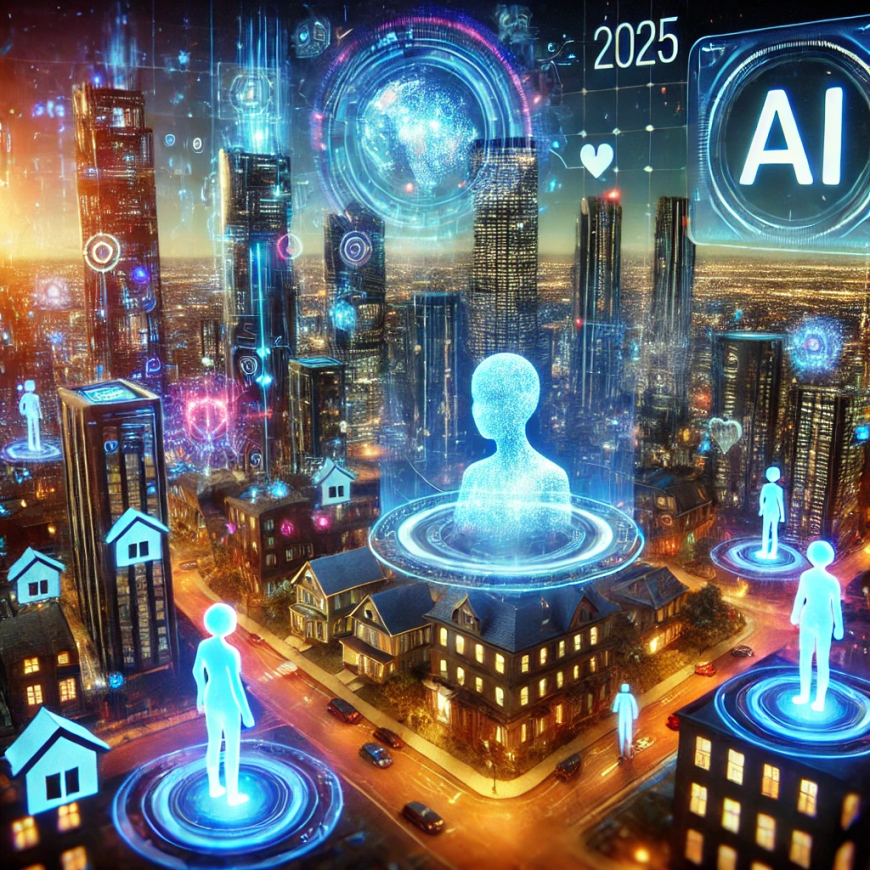The Evolution of Virtual Real Estate: How AI is Shaping Metaverse Property Markets in 2025
Discover how AI is transforming virtual real estate in 2025, from automated property valuations to AI-powered metaverse cities. Explore the future of digital land investment and the role of artificial intelligence in shaping metaverse property markets.

Virtual Real Estate is No Longer Just a Game
If someone told you ten years ago that people would be spending millions of dollars on digital land, you probably would have laughed. I mean, why would anyone pay real money for something they can’t even physically stand on? But here we are in 2025, and virtual real estate is not just booming—it’s becoming one of the most valuable digital assets in the world.
From digital landowners flipping properties in the Metaverse to corporations setting up AI-powered virtual headquarters, the way we buy, sell, and invest in digital property is changing fast. And leading the charge? Artificial Intelligence (AI).
AI is making metaverse property markets smarter, more profitable, and accessible to more people than ever before. If you're still wondering how AI is shaping this digital frontier, let’s dive into the future of virtual real estate and why it’s something you should be paying attention to.
1. The Rise of Virtual Real Estate: From Pixels to Profits
1.1 The Early Days: Virtual Land Was Just a Novelty
Remember the early days of Second Life and Minecraft? Virtual spaces were mostly just for fun—people created houses, cities, and fantasy worlds, but there was no real financial incentive to own digital land.
Then came the crypto boom and the rise of blockchain-based virtual worlds like Decentraland, The Sandbox, and Otherside. Suddenly, digital land was scarce, valuable, and tradable, just like real-world property.
1.2 Why Virtual Land Became a Multi-Billion Dollar Market
By 2022, companies like JP Morgan, Adidas, and Gucci had already entered the metaverse, buying virtual spaces to build brand experiences. Real estate investors saw this and thought, “Wait, if big brands are doing it, there’s money to be made.”
This shift turned virtual real estate into a legitimate investment class, similar to physical real estate but with some serious advantages:
✔ No maintenance costs – No need to worry about plumbing or electricity.
✔ Global accessibility – Buy land in a metaverse and instantly connect with a worldwide audience.
✔ Scalability – A single plot of land can generate infinite revenue through advertising, rentals, and events.
2. How AI is Revolutionizing Metaverse Real Estate
While blockchain made virtual land valuable, it’s AI that’s making it intelligent. AI is revolutionizing how people invest, manage, and profit from digital properties.
2.1 AI-Powered Virtual Architects
Want to build a stunning digital mansion or a futuristic shopping mall? AI-powered design tools can now create entire metaverse properties in minutes—customized to your specifications.
???? Example: Platforms like Midjourney and Stable Diffusion are being integrated into metaverse builders to generate instant 3D models.
This means you don’t need expensive 3D designers—just input a description, and AI does the rest.
2.2 AI Real Estate Agents & Automated Valuations
Buying virtual real estate used to be complicated and risky—how do you know if a piece of land is actually worth anything? AI now solves this by analyzing:
✔ Location-based demand (proximity to high-traffic areas in the metaverse)
✔ Market trends and past sales data
✔ Revenue potential from rentals, events, and advertising
???? Example: AI-powered real estate tools like Parcel.gg already provide data-driven valuations for Decentraland properties. By 2025, fully AI-driven agents will handle buying and selling automatically.
2.3 AI-Powered Virtual Tenants & Smart Contracts
Imagine owning virtual property and having AI-driven tenants that rent the space, pay rent using smart contracts, and even manage digital businesses within it.
Sounds crazy? It’s already happening.
???? Example: Some virtual landlords in The Sandbox and Somnium Space rent their land to AI-powered chatbots, digital influencers, and automated stores that generate passive income.
This creates a fully automated economy—AI tenants running AI businesses on AI-managed land. Welcome to the future.
3. The Biggest AI-Driven Trends in Virtual Real Estate for 2025
AI isn’t just optimizing virtual real estate—it’s completely reshaping how we experience digital spaces. Here are some major trends to watch.
3.1 AI-Generated Smart Cities in the Metaverse
Instead of manually designing entire cities, AI is now generating fully interactive metaverse environments. These smart cities will have:
✔ AI-powered public services like transportation & automated security
✔ AI-driven business districts where companies operate virtually
✔ AI-enhanced interactive experiences, making digital life feel real
???? Example: Metapolis, the first AI-driven virtual city, is being developed to create an autonomous, self-sustaining digital ecosystem.
3.2 AI-Driven Land Development & Rentals
Not everyone wants to buy land—many just want to rent digital spaces. AI-driven rental platforms are now automating:
✔ Short-term rentals for digital events
✔ Long-term rentals for businesses & influencers
✔ Instant leasing based on AI market analysis
???? Example: AI-powered metaverse malls are now leasing virtual storefronts to brands, generating rental revenue 24/7.
3.3 The Rise of AI-Powered NPCs & Automated Commerce
One of the biggest challenges in early metaverse projects was that they felt empty—people bought land, but there wasn’t much to do. AI is fixing that by populating virtual worlds with smart NPCs (non-playable characters) that:
✔ Act as virtual store assistants
✔ Create real-time interactive experiences
✔ Run businesses and provide entertainment
???? Example: AI avatars in Decentraland are already serving drinks in virtual bars—by 2025, AI-run businesses will be the norm.
4. Should You Invest in AI-Powered Virtual Real Estate?
So, with all these advancements, is it time to start buying digital land?
Pros of Investing in Virtual Real Estate
✅ High-growth potential – Early investors could see huge returns.
✅ No maintenance costs – Unlike real-world property, digital land requires zero upkeep.
✅ AI automation – AI-driven rentals and businesses mean passive income is possible.
Risks to Consider
❌ Market volatility – Just like crypto, virtual land prices can fluctuate.
❌ Adoption uncertainty – Some metaverse projects may fail if they don’t gain users.
❌ Regulatory unknowns – Governments may introduce laws that impact digital property ownership.
For high-risk, high-reward investors, AI-powered virtual real estate could be one of the most lucrative digital assets of the decade.
5. Final Thoughts: The Future of Virtual Real Estate is AI-Driven
Five years ago, the idea of owning land in a metaverse sounded ridiculous. Today, it’s a multi-billion dollar industry. By 2025, AI will completely redefine digital real estate, making it:
✔ Easier to buy, sell, and manage
✔ More valuable as businesses and brands move in
✔ Fully automated, allowing for passive income opportunities
So, the big question is—will you be an early adopter or just watch from the sidelines? Because one thing’s for sure: the AI-powered metaverse isn’t just the future, it’s already here.







